|
|
|
Sort Order |
|
|
|
Items / Page
|
|
|
|
|
|
|
| Srl | Item |
| 1 |
ID:
178247
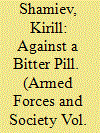

|
|
|
|
|
| Summary/Abstract |
From 2007 to 2012, Russian armed forces faced unprecedented changes that affected their structural, economic, social, and ideological elements. However, not all aims were fulfilled, and some changes were rolled back, despite the political and financial support from Vladimir Putin and Dmitry Medvedev for the defense minister Anatoly Serdyukov. Using the data from 11 interviews with former high-ranking military officers, scholars, and insider press workers, the research shows that the unsustainability of the reform was caused by the radicality of changes, the interest groups influence, and the technocratic policymaking in nondemocratic Russia. In addition, the research demonstrates the strategies the reformers used in order to overcome the resistance from mobilized interest groups. They had not succeeded, that ultimately led to the resignation of the defense minister, which stopped further radical changes in the contemporary Russian armed forces.
|
|
|
|
|
|
|
|
|
|
|
|
|
|
|
|
| 2 |
ID:
179278
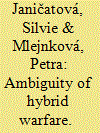

|
|
|
|
|
| Summary/Abstract |
Since the annexation of Crimea in 2014, hybrid warfare has become a widely used yet ambiguous term to describe Russia's hostile activities. In academic publications and policy documents, there have been a plethora of different definitions and concepts to make sense of hybrid warfare. This article takes a bottom-up approach and analyzes the discourse of political and military representatives in the United Kingdom to explore how they understand hybrid warfare by Russia and what the implications are for defense policy. Using qualitative content analysis with quantitative aspects, the results show not only a range of different terms used to describe Russia's hostile activities, but also that the discussed topics do not reflect one particular definition of hybrid warfare. The analysis further reveals that representatives highlight non-military aspects of hybrid warfare over the military ones and consider the role of defense policy dependent on the nature of a particular hybrid threat.
|
|
|
|
|
|
|
|
|
|
|
|
|
|
|
|
| 3 |
ID:
167823
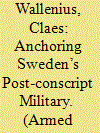

|
|
|
|
|
| Summary/Abstract |
The universal nature of conscription ties or anchors broad segments of society to the military. What happens to societal anchoring after the draft ends? Using in-depth interviews with two groups of elites, this article explores factors that promote and hinder the Swedish Military’s societal anchoring post-conscription. The first group consisted of 18 executives at the Swedish Armed Forces (SAF) headquarters with strategic positions in relation to societal anchoring. The second group consisted of 15 representatives from the corresponding political level: members of the parliamentary Committee on Defense and their officials. The interviews were semistructured and analyzed according to a grounded theory-inspired approach. Main themes concerning obstacles were the public’s low interest and dated knowledge, an unclear political debate resulting in vague expectations concerning the SAF, as well as unclear responsibility for informing the public, and confidence gaps between the military and the political elite.
|
|
|
|
|
|
|
|
|
|
|
|
|
|
|
|
| 4 |
ID:
153713
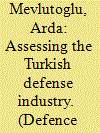

|
|
|
|
|
| Summary/Abstract |
The reform process of Turkish defense industry as launched in the last quarter of the twentieth century has seen several achievements, as well as downfalls, and passed through major milestones. The resultant industrial structure is unique, compared to the other sectors in the country. Dominated by the TSKGV (Turkish Armed Forces Foundation), the major goal of the sector has always been involved in attaining self-sufficiency, indicative of an import substitution-oriented industry policy. This strategy is evident in decision-making and execution processes of virtually all defense procurement programs. However, lack of an efficient mechanism for science and technology policy-making mechanism, is observed as a major obstacle toward sustainable development of the sector. Although benefited from the overall economic take-off during the 2000s, today the Turkish defense industry faces to the challenge of sustainability, which is heavily dependent on export performance. The forthcoming period will test the sector, revealing the necessary coordination and communication by and between the military and civilian bureaucracies.
|
|
|
|
|
|
|
|
|
|
|
|
|
|
|
|
| 5 |
ID:
162547
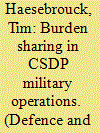

|
|
|
|
|
| Summary/Abstract |
Military burden sharing has been a subject of repeated debates in NATO and the UN. Despite more modest goals, the European Union’s (EU) Common Security and Defense Policy (CSDP) has experienced no fewer difficulties in garnering men, money, and materiel. While this may not come as a surprise, the fact that some EU member states have carried disproportionate shares of the burden of CSDP operations is a puzzle that remains unaccounted for. We address this gap by analyzing determinants of contribution levels to CSDP operations. In employing an innovative multi-method design that combines insights from collection action theory with those from integrated theories of military burden sharing, our results indicate that EU countries tend to contribute in positive disproportion with their capabilities when they have a strong peacekeeping tradition and elections are distant. In contrast, they undercontribute when small trade volumes with the area of operations combine with a weak peacekeeping tradition.
|
|
|
|
|
|
|
|
|
|
|
|
|
|
|
|
| 6 |
ID:
152756
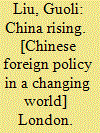

|
|
|
|
|
| Publication |
London, Palgrave, 2017.
|
| Description |
xi, 241p.pbk
|
| Standard Number |
9780230206649
|
|
|
|
|
|
|
|
|
|
|
|
Copies: C:1/I:0,R:0,Q:0
Circulation
| Accession# | Call# | Current Location | Status | Policy | Location |
| 059042 | 327.51/LIU 059042 | Main | On Shelf | General | |
|
|
|
|
| 7 |
ID:
125377
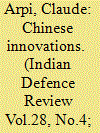

|
|
|
|
|
| Publication |
2013.
|
| Summary/Abstract |
When Steve Jobs passed away, experts debated as to why China did not produce its own Steve Jobs, Bill Gates, or Mark Zuckerberg? One contributor to Forbes explained that the emergence of such 'innovative' entrepreneurs "does not blend well with China's culture of Confucian conformity to existing norms. Throughout China's history, the established order saved little respect for inventors, entrepreneurs, and business pioneers." There is some truth in this, but the Confucian conformity added to the Communist bureaucracy and the supreme importance of the Party's diktats is today balanced by a tremendous will to 'innovate' in order to materialise the Chinese Dream. The Indian Dream has unfortunately not even been formulated as yet. It is a great pity because the ingredients (brains) are very much present.
|
|
|
|
|
|
|
|
|
|
|
|
|
|
|
|
| 8 |
ID:
189920
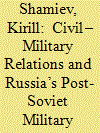

|
|
|
|
|
| Summary/Abstract |
This article studies the role of military culture in defense policymaking. It focuses on Russia’s post-Soviet civil–military relations and military reform attempts. After the fall of the Soviet Union, Russia’s armed forces were in a state of despair. Despite having relative institutional autonomy, the military neither made itself more effective before minister Serdyukov nor tried to overthrow the government. The paper uses the advocacy coalition framework’s belief system approach to analyze data from military memoirs, parliamentary speeches, and 15 interviews. The research shows that the military’s support for institutional autonomy, combined with its elites’ self-serving bias, critically contributed to what I term an “imperfect equilibrium” in Russian civil–military relations: the military could not reform itself and fought back against radical, though necessary, changes imposed by civilian leadership.
|
|
|
|
|
|
|
|
|
|
|
|
|
|
|
|
| 9 |
ID:
161543
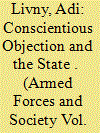

|
|
|
|
|
| Summary/Abstract |
The abundant writing on conscientious objection (CO) had kept one significant actor rather neglected—the state. Relatively unexplored is the question of how democracies shape their policies toward CO. This article wishes to address this gap, focusing in particular on states that maintain conscription, and examining what accounts for their different responses to CO. Based on the Israeli case study, while drawing on comparative insights from The Federal Republic of Germany and Switzerland during the Cold War, I argue that states’ treatment of CO depends primarily on the military’s status and the type of roles assigned to conscription. States in which these roles are mainly functional, and the military does not enjoy, accordingly, a high symbolic status will be more inclined to formally recognize CO than states in which the military fulfills civilian–social roles and enjoys a high symbolic status. Lack of recognition, however, does not necessarily imply harshness; states of the latter sort might nonetheless accommodate CO through unofficial means. Thus, when discussing the policy towards CO a distinction is ought to be made between accommodation and recognition.
|
|
|
|
|
|
|
|
|
|
|
|
|
|
|
|
| 10 |
ID:
107576
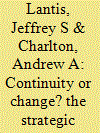

|
|
|
|
|
| Publication |
2011.
|
| Summary/Abstract |
Important puzzles remain in security policy literature, including whether strategic culture can change over time, and if so, under what conditions. This study proposes a model of strategic cultural change that identifies key actors and conditions at work in the process. The article then applies the model to chart the evolution of Australian security policy in the past two decades. We find that structural changes, including geostrategic situation and new security threats, coupled with elite interpretation and discourse, have produced a new "regional defense plus" strategic cultural frame for Australia. This, in turn, has led to measureable changes in defense policy. This work concludes with insights on the implications of change for the broader literature on strategic culture and constructivist security studies.
|
|
|
|
|
|
|
|
|
|
|
|
|
|
|
|
| 11 |
ID:
113329
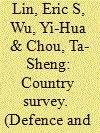

|
|
|
|
|
| Publication |
2012.
|
| Summary/Abstract |
In this article we survey military spending, the evolution of national defense policy, and the role that defense spending played in economic activities in Taiwan from 1952 to 2009. With the ongoing cross-Strait dialogue and closer commercial ties between Taiwan and China, the share of military spending in government expenditures (or GDP) has tended to gradually decline, which is in accordance with the change in defense policy from an offensive posture to a defensive-oriented attitude. In addition, we investigate the defense spending-inflation nexus in Taiwan. The multivariate structural change test identifies two break points and three regimes are categorized accordingly. The Granger causality test based on the VAR model reveals that the heavy defense burden in Taiwan during 1952-71 (the first regime) is essentially an important factor causing the higher price levels. However, when the tension across the Taiwan Strait is alleviated as well as the defense-oriented policy adopted, the military spending no longer plays a crucial role in determining inflation in the recent two regimes. Sensitivity analysis confirms that our results are robust to different model specifications.
|
|
|
|
|
|
|
|
|
|
|
|
|
|
|
|
| 12 |
ID:
126440
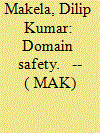

|
|
|
| 13 |
ID:
126441
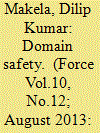

|
|
|
|
|
| Publication |
2012.
|
| Summary/Abstract |
The stage for the cyber war has already been set, albeit secretly. In the last two months, the revelations made by the US' ex-Central Intelligence Agency employee, Edward Snowden, in various interviews to The Guardian newspaper, revealed that the US' intelligence organisation, National Security Agency (which had launched the top-secret PRISM programme) was snooping on personal data of individuals and governments in the US and across the world through the internet. He also revealed that the National Security Agency (NSA) intercepted a big chunk of sensitive information that belongs to India by spying on the embassies and their diplomatic missions. And perhaps the most daunting revelation was that the information sharing between the intelligence agencies of various countries, such as the US and the UK, is already underway.
|
|
|
|
|
|
|
|
|
|
|
|
|
|
|
|
| 14 |
ID:
160626
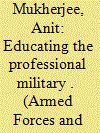

|
|
|
|
|
| Summary/Abstract |
This article analyzes the ways in which civil–military relations shape professional military education (PME). Its main argument is that military education benefits from a civil–military partnership. In doing so, the article examines the role of civil–military relations in shaping PME in India. While describing the evolution of military education in India, it analyzes its weaknesses and argues that this is primarily due to its model of civil–military relations, with a limited role for civilians. Theoretically, this argument challenges Samuel Huntington’s notion of “objective control”—which envisaged a strict separation between the civil and military domains. Conceptually, this article argues for a greater dialogue on military education among civilians, both policy makers and academics, and military officers and not to leave it to the military’s domain—as is currently the practice in most countries.
|
|
|
|
|
|
|
|
|
|
|
|
|
|
|
|
| 15 |
ID:
113826
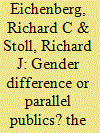

|
|
|
|
|
| Publication |
2012.
|
| Summary/Abstract |
Gender is now recognized as an important dividing line in American political life, and scholars have accumulated evidence that national security issues are an important reason for gender differences in policy preferences. We therefore expect that the dynamics of support for defense spending among men and women will differ. In contrast, several scholars have shown that population subgroups exhibit a "parallel" dynamic in which the evolution of their preferences over time is very similar, despite differences in the average level of support. Unfortunately, there is little time series evidence on gendered reactions to policy, including defense spending, that would allow one to arbitrate between these competing perspectives. In this research note, we assemble a time series of support for defense spending among men and women and model the determinants of that support for the period 1967-2007. We find that women are on average less supportive of defense spending than are men. However, we also find that the over time variation of support for defense spending among men and women is very similar-each is conditioned principally by the past year's change in defense spending and occasionally by war casualties and a trade-off between defense and civilian spending.
|
|
|
|
|
|
|
|
|
|
|
|
|
|
|
|
| 16 |
ID:
108342
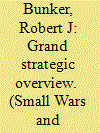

|
|
|
|
|
| Publication |
2011.
|
| Summary/Abstract |
This grand strategic overview highlights and analyzes the influence of epochal change on the state and conflict and the new realities with which the United States must now contend. This deep context is being provided so that (1) the belligerent and politicized non-state entities that have emerged in Mexico and the Americas can be better understood within the larger three-front grand strategic temporal conflict the US is now engaged in; and (2) the stark realities that the US faces - such as loss of unilateral world dominance, increasing debt and ongoing deficits, shifting demographics, inability to staunch the flow of and demand for illicit drugs, and an increasing prison population - are highlighted. Finally, this essay finishes with a discussion of the many important contributions contained in this edited work.
|
|
|
|
|
|
|
|
|
|
|
|
|
|
|
|
| 17 |
ID:
126469
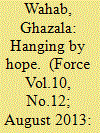

|
|
|
|
|
| Publication |
2012.
|
| Summary/Abstract |
New Delhi: Atlas Elektronik's plans in India seem to have hit a speed breaker called the Hindu rate of growth. While there is potential and promise, the movement is inordinately slow and the answers are hard to come by. So effectively, the India office of Atlas, launched with much optimism a few months ago, is currently doing spot-running, with several programmes in various stages of 'expression of interest', 'request of information', request for proposal', 'technical discussions' and so on. While it is difficult to sustain optimism in such trying circumstances, Atlas Elektronik India Pvt Ltd is manned by a group of seasoned professionals who have dug themselves in for a long haul. "We are here for a long time," says CEO, Atlas Elektronik India Pvt Ltd, Khalil Rahman matter-of-factly. "We have to look beyond prevalent pessimism," he adds for good measure.
|
|
|
|
|
|
|
|
|
|
|
|
|
|
|
|
| 18 |
ID:
173755
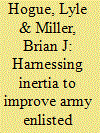

|
|
|
|
|
| Summary/Abstract |
Army recruiting, initial entry training, and retention enterprises consume tremendous manpower resources and become disproportionately more expensive and challenging as the size of the Army increases. Fortunately, empirical evidence suggests that the Army could readily improve enlisted continuation rates by changing enlistment contracts from its present form, requiring soldiers to reenlist or opt-in to continue service, to open-ended enlistment contracts that require soldiers to opt-out of service upon fulfilling their service obligations. Changing enlistment contracts to an opt-out paradigm—similar to how officer populations are currently managed—could greatly increase the number of soldiers who continue service past their initial enlistment obligation. Improved continuation rates could save the Army hundreds of millions in recruiting and reenlistment incentives, as well as freeing thousands of Non-Commissioned Officers serving as recruiters, drill sergeants, and retention specialist to support other operational requirements.
|
|
|
|
|
|
|
|
|
|
|
|
|
|
|
|
| 19 |
ID:
104149
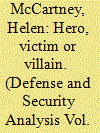

|
|
|
| 20 |
ID:
186534
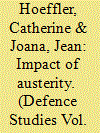

|
|
|
|
|
| Summary/Abstract |
While much scholarship takes austerity-driven spending cuts as evidence of policy change, this paper shifts the focus to interrogate whether these budgetary cuts lead to actual policy change and if so how. Scholarships on institutional change and public policy illuminate how state actors mediate policy change through coping strategies, i.e. strategies by which state actors try to minimize budget decreases’ negative impacts on policy. Taking French Defense Policy as an unlikely case of policy change, we show that state actors have adopted three types of coping strategies to minimize the spending cuts’ impact: compensation, delaying, and re-categorizing acquisition procedures. These coping strategies have however contributed to a process of incremental change, which most of time is non-cumulative and creates additional policy problems. This article contributes to a better understanding of change underway in defense policies, but also more generally to literatures pertaining to austerity and policy change.
|
|
|
|
|
|
|
|
|
|
|
|
|
|
|
|
|
|
|
|
|